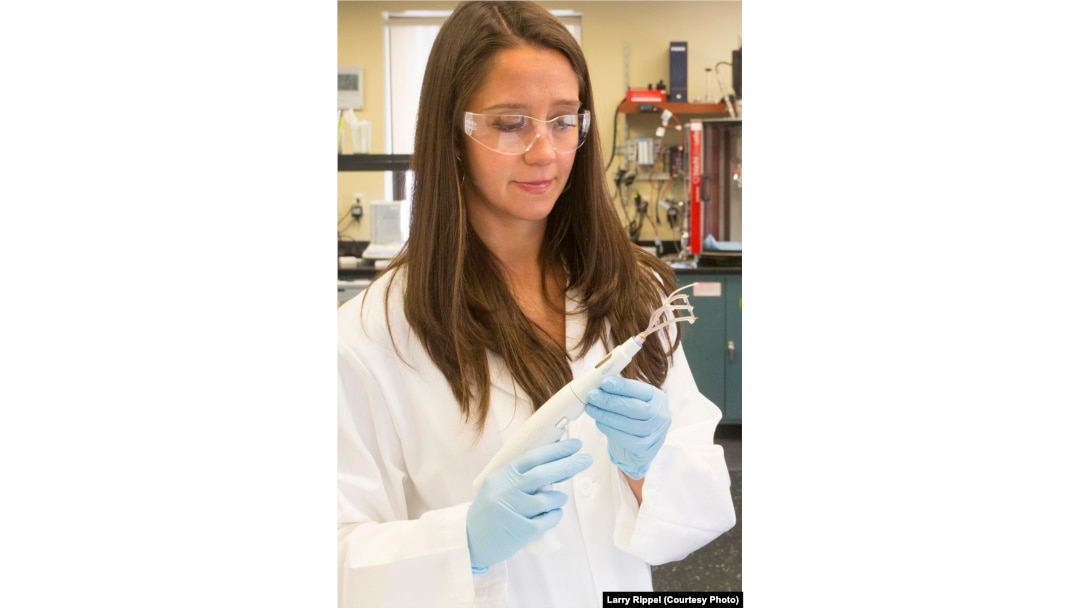The first biodegradable surgical glue for internal use has won approval from the U.S. Food and Drug Administration.
While medical sealants and liquid bandages are becoming more common, none had been approved for use inside the body until now.
The product is called TissuGlu and came about by accident, said University of Pittsburgh engineering professor Eric Beckman.
Fifteen years ago, he and Michael Buckley, then an oral surgeon at the university’s School of Dental Medicine, set out to design a tissue regeneration membrane. In the process, they produced a sticky, gluelike substance.

Despina Dobbins of Cohera Medical demonstrates the TissuGlu device, which administers adhesive inside the body. TissuGlu is the first biodegradable surgical glue approved for internal use by the U.S. Food and Drug Administration.
“The substance at the time in the lab was just a science project,” Beckman said. “It was a laboratory material. TissuGlu is orders of magnitude more sophisticated.”
Nontoxic urethane
TissuGlu is a nontoxic version of urethane, a chemical compound used in the manufacture of plastic. Surgeons can use the adhesive to reconnect skin and tissue inside the body. Beckman said they saw the opportunity to develop and market it.
“Step one was to find a business team that could actually help us turn essentially what was a technology into a real product and then get it through the regulatory pathway,” he said.
In 2006, Beckman took an entrepreneurial year leave of absence from the university and co-founded Cohera Medical Inc. One of the first employees was Dottie Clower, a scientist who worked in the Office of Enterprise Development at the University of Pittsburgh and had advised Beckman about spinning off his technology. Now she is working with him as Cohera's chief scientific officer charged with product development.
Clower said that what made TissuGlu an attractive business opportunity was the simplicity of the idea.
“This was glue that you could use inside the body, and everyone understood that," she said. "This was something that nobody had in their tool kit.”
That simple idea raised $75 million from investors.
The team went on to refine TissuGlu and take it through clinical trials, where it was proven strong, safe and effective. Surgeons work with a three-pronged, preloaded, hand-held device that steadily administers uniform drops of the adhesive.
This year, Cohera won approval from the FDA to use TissuGlu to attach large tissue and skin flaps after excess fat and skin have been removed from the abdomen. About 175,000 such abdominoplasty surgeries are done each year in the United States, and the number is growing.
Fluid buildup reduction
Beckman said the adhesive also helps reduce fluid buildup after the procedure by holding tissues close together.
“If you can eliminate dead space between tissue planes by using TissuGlu, we’ve shown in our clinical trials that there is a strong potential to send patients home without having surgical drains,” he said.
The new glue also means fewer complications and a more rapid postoperative recovery. In Europe, it has been approved for use in breast cancer and lymph node dissection surgeries.
Cohera is working on another sealant for bowel surgery.
Clower said this is an exciting time for the company.
“Now we have the opportunity to engage with the market, to talk with the doctors, to begin to really launch our sales and marketing effort for this great new product,” she said.
Looking back on his journey from academia to entrepreneur, Beckman said he learned to target an idea, run with it and never let obstacles stand in his way.

